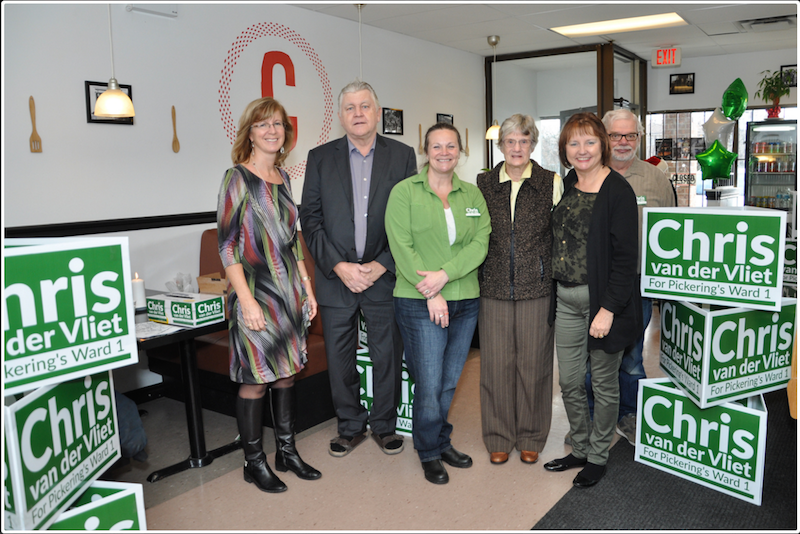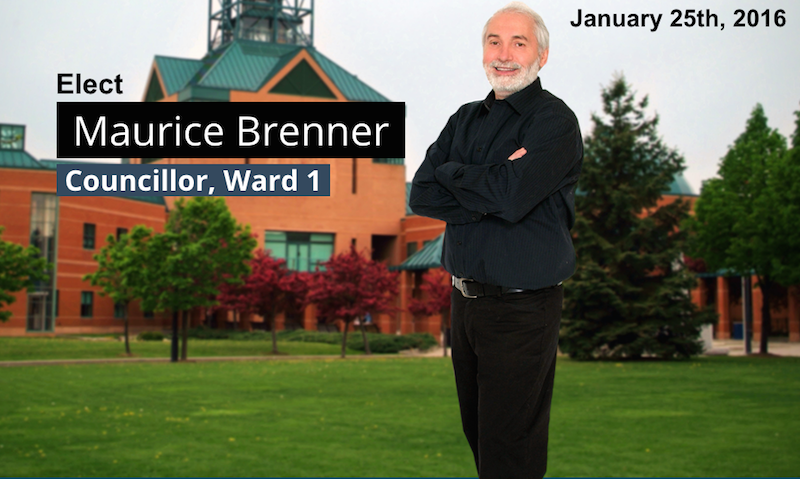Back in November I decided to throw my name in the hat as the Pickering Ward 1 seat became available when long-time Ward 1 City and Regional Councillor Jennifer O’Connell won the seat for the Liberals during last October’s federal election. With that victory, Ward 1 City Councillor Kevin Ashe was appointed to the Regional seat and his City Councillor spot became vacant. 12 people signed up to compete for the opportunity (myself included) and for two and a half months this winter we took to the task of convincing the almost 23,000 Ward 1 residents that each individual was the best choice to be their new municipal representative. In the end 21-year City Council veteran Maurice Brenner claimed victory and was elected the Ward 1 representative at Pickering Council.
As a first-time runner, I wanted to get some of the other candidates perspectives on their own motivations and standpoints in running for the position. I myself had a dismal outcome, with a very low number of votes, but was very happy and grateful for the experience, as it was absolutely eye-opening and taught me a lifetime’s worth of lessons and experiences in politics that I would’ve never obtained from any book or classroom. And so I met with Chris van der Vliet and Lisa McFarland, two of the candidates who got the highest numbers of votes, to talk about the aftermath of the rather intense 75-day process. I also had a chance afterwards to have a phone conversation with Councillor Brenner so he could also give his account of the experience of running in the by-election this time around.
Both McFarland and van der Vliet are long-time Pickering Ward 1 residents and have been involved in the community in many capacities. They both had the unwavering support of their immediate families (something vital when running for office) when making this life-altering decision. Van der Vliet says she felt ready, that this was the right time and she had a lot of support and encouragement from family (husband, five children and extended family) and friends. She prepared exhaustively and was diligent and detailed-oriented in her approach. She also utilized her years of experience as a former IBM executive to put a comprehensive strategy in place. She sought the advice of City of Pickering Mayor Dave Ryan and she also talked to the Mayor of Whitby and other councillors to get a feel for what she was getting herself into.
Similarly, McFarland talked it over with her family as well before embarking on this long and taxing process. She called Councillor Kevin Ashe to find out what exactly the role entailed and what were the expectations, were she to win the seat. She has been a tireless community advocate in the past, has done a lot of volunteer work but she also had to give careful consideration to what this would mean to her young family (husband and three young children). “I love people, I love helping, I love fixing problems. I’m one of those people, I get things done. I’m going to go after this.” She also felt it was the right time and decided to go for it. And even though she lost this time around, she was happy and proud of her participation in the process. “My kids are fairly young. Just getting them involved in democracy and seeing how things work, I mean, what an experience. Heck, I spent the equivalent of over a year of university fees on this campaign. But it’s an invaluable experience. You can never get this in a classroom and you can never know what this is like until you do it.”
Running for Council, but particularly for municipal politics, can really be a pricey experience, we all found out the hard way. Starting with the $100 nomination form filing fee, to ordering your own literature (campaign flyers and such), to newspaper or TV ads (can run you from hundreds to thousands) to ordering street signs (also can go from hundreds to thousands of dollars), this could easily be an expensive endeavour. Fundraising is an option, but unfortunately contributions to municipal campaigns are only tax-deductible in certain municipalities. In the case of Pickering, they’re not. Elections can also be quite physically taxing and time-consuming. With this particular by-election happening in wintertime, it became a gruelling adventure because the 12 candidates vying for the position were not just competing with one another, but also with the unpredictable and unforgiving elements.
Campaigning is nothing new for veteran politician Maurice Brenner, who after a 21-year uninterrupted run as City Councillor, found being away when he lost the election 10 years ago a very humbling experience, but one that in the end led to positive learning. “You don’t learn to be humble by winning every election,” said Brenner. “You learn to be humble by losing an election. I believe that’s a positive learning ‘cause it takes you back to your grassroots. When you go back to your grassroots, it’s a constant reminder: ‘You are there at the pleasure— not an entitlement— but at the pleasure of individuals who have decided to put their trust.” Coming back to Council with all that outside experience as a community advocate gave him a whole new perspective and outlook on the job and what needs to be done in the future.
Political views and issues were as varied as they could be with this high number of hopefuls. For McFarland, women’s issues and diversity were at the forefront of her campaign, as she is quite passionate (and has always been, since her school years) about those particular issues. “My gosh, there are no women, there’s no diversity (in Council),” she utters enthusiastically during our conversation. “Every single essay in my university career was always on women’s issues. I have a passion for women and women’s studies. When you consider that 50% of our population in Pickering is women, 35% visible minority, I mean, how come we don’t have any representation of any kind?” Van der Vliet mirrors the sentiment. “I want equal representation on the council. And government works better when you have more female representation. We think differently. And so I’d like a different perspective. I do think that we have a different way and a different approach of handling certain things. It’s a fresh approach.”
Van der Vliet also felt strongly that historically council membership has not reflected the number of women in the community and the diversity of the population. She would tell people she talked to that if they would not consider voting for her to at least try to vote to put a woman in council. To her credit (and her amazing strategy and the help from volunteers) she managed to knock on every single one of the 9,000 doors in Ward 1 during the 75-day duration of the campaign. “I hit every door in the ward,” she proudly states. “I started day one when I signed up and I did six to eight hours a day.” She tells us that running this campaign was very similar to the time when she was pregnant with her youngest son, Thomas. “I was in the best health I had ever been in with his pregnancy because I was so worried that I was in my 40s, I’m having a baby, I don’t want to screw this up. I was exercising, I was eating healthy, I was sleeping. I know I did the very best I could’ve done. This campaign was the same thing. I said, ‘What do I need to do? I need to knock on doors, I need to engage people.’ I couldn’t have done anything more. If at the end of the day I didn’t win, if I looked back, I didn’t want any regrets to say ‘I could’ve done this’ or I would’ve second-guessed it.”

Photo Courtesy of Chris van der Vliet
Being so vocal about the importance of women’s issues and diversity may have backfired and rubbed some people the wrong way, McFarland admits, and she was shocked to find out that some people took offence on her running for women and for a diverse population, and that putting those at the forefront of her campaign may have been a risky move, but she feels strongly and happy that she did. “I was trying to make people aware. If it’s not on their radar, it is something they may never even consider. I’m hoping I brought that awareness about and maybe by 2018 things will be different. I think Pickering is stuck in another time dimension. That’s why I think I got disappointed because I thought people should be more progressive than that.” Both she and van der Vliet (as do many residents, myself included) don’t feel that our Council reflects that.
Getting a diverse population more involved in the civic process— not just as candidates but also as voters— should be an issue to be discussed more widely for future elections, and Councillor Brenner agrees. “Diversity is a matter of removing the barriers. Well, certainly the barriers were removed for people to put their names forward and to feel empowered. That wasn’t the issue. How do we mobilize that diverse population to feel engaged and empowered to come out and vote? Whether or not they vote for candidate A, B or C, that becomes their right to make that choice. The question is are they engaging and are they voting?” One suggestion he has is to get cultural and ethnic groups and organizations on board and to create open forums so as to reach out and help them empower their memberships/groups to get involved in elections, not just as candidates but as knowledgeable voters. Enlightened voters can impact the outcome of an election, affirms Brenner.
Which begs the question that I pose to all of them: Why is it that the commitment of those who run as candidates in an election (this by-election in particular) does not get an equal response in participation on the part of the voters? Voter apathy in Pickering is dismal, with only 30 to 35% of the population normally voting in municipal elections. In this by-election, out of 23,000 eligible voters, only 3,300 cast their ballots— a dismal number to say the least. Community engagement, says Councillor Brenner, is a concern that politicians at a municipal level have always raised through the years and the many elections that have taken place.
“For whatever reason people do not seem to recognize that it’s the municipal politics— which is the grassroots day-to-day that touches your lives. Is there a fix? I think we all need to keep reinforcing the importance of municipal politics.” He feels that organizations like AMO (Association of Municipalities of Ontario) should for example make an effort to educate the public to help them become more engaged with the municipal political process. “I think that as a group of municipalities (AMO) this needs to be a task to look at best practices around the world as to what gets people engaged at a municipal level. We just need to find ways to get more people out to vote to be able to ensure that democracy in fact reflects not just the vocal minority that vote, but also the silent majority who fails to vote, which is sometimes 70%.”

Photo Courtesy of Maurice Brenner.
I ask both McFarland and van der Vliet if they would’ve said or done anything differently when knocking on doors. “Gosh, no,” interjects McFarland right away. “You have to be true to yourself and I am true to myself. This is what I believe and I really believed that Pickering was looking for a fresh change. I feel like I gave it everything I could.” Having actively participated in the same campaign, I am literally in awe of how these two women ran theirs, with such diligence and discipline, and I can’t but truly admire the effort, passion and the commitment that they both showed— especially considering the obvious disadvantage of running in a community that is possibly years away from becoming a little more progressive and open-minded when choosing their municipal government officials.
In the aftermath of the by-election— an experience that may have been quite intense and draining for many of us who took to walking the streets of Ward 1 trying to speak to as many residents as possible— there is also a lot of positive in the outcome, even though 11 of us did not win the seat. Some may be a little more experienced, ready and eager to tackle the challenge once again for the next election. Some of us may be a little more disenchanted with the process, taking it as one more experience that we accomplished but it’s over and done with. But I suspect all of us will continue to work with the community in the capacity that best suits us, in turn raising awareness and contributing in any way we can to move Ward 1 as well as all of Pickering forward, hopefully helping it to become a more progressive and engaging municipal political process. As part of council, Councillor Brenner hopes to promote the same. “Being involved doesn’t mean being elected. Being involved is contributing and building in the community in the best way you can.” Picking up where he left off, Councillor Brenner is hoping to get the dialogue going with everyone who ran in this by-election, a sentiment van der Vliet, McFarland and I’m sure the rest of the candidates share as well.









